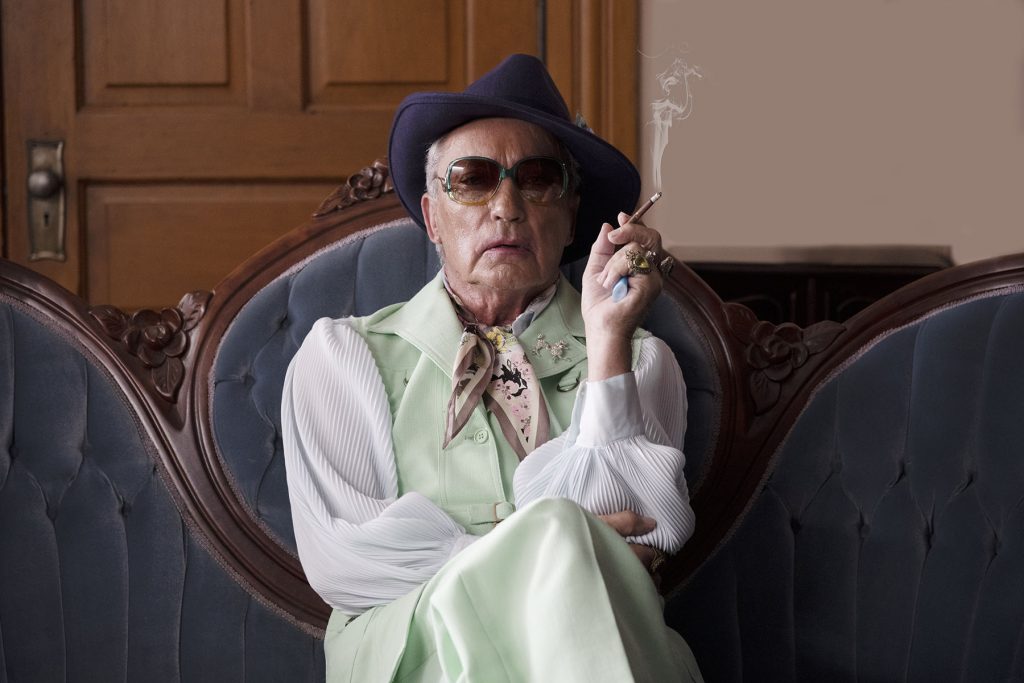Swan Song ’s story may be simple and straightforward, but Udo Kier’s colorful and charismatic character work makes this eccentric escapade worth a watch.
American activist Betty Friedan once said, “Aging is not lost youth, but a new stage of opportunity and strength,” and in more ways than one, Todd Stephens’ Swan Song speaks to the sincerity of this statement. With each passing year, it’s easy to feel as if you’re increasingly becoming obsolete, letting opportunities pass you by and never living up to your full potential as the goals you set for yourself when you were growing up are left unaccomplished. Perhaps this emotion has been intensified exponentially because of the pandemic as well, as almost all of our lives have been put on pause, with significant moments stolen from us, never to be experienced again. Therefore, when a film like Swan Song comes along and tells us that it’s not too late to do something right and rediscover our “shine,” it feels like a sign sent from the heavens above – and it reminds us that our best days lie ahead of us, not behind.
Swan Song begins by introducing audiences to the ill-tempered Pat Pitsenbarger (Udo Kier, of Bacurau and Suspiria), a quarrelsome old queen who once made his living working as a heralded hairdresser back in the day but now finds himself holed up in a nursing home, wasting away and reminiscing on the amusement of his adult life years prior – particularly the moments spent with his deceased lover, David (Eric Eisenbrey, of Another Gay Movie). However, in a unexpected turn of events, Pat is notified that one of his favorite former clients, Rita (Linda Evans, of The Big Valley and Dynasty), has died – and her last wish was for Pat to style her for her funeral.
With this new mission in mind, Pat flees from his assisted living facility, setting off on a search across the entirety of his small-town of Sandusky, Ohio to acquire the appropriate beauty supplies for Rita’s last look. However, along the way, he’s also forced to come face-to-face with the people of his past, both the good – such as the endearing and eccentric Eunice (Ira Hawkins, of Asunder and Just My Luck), a best friend from Pat’s days at the gay bars – and the bad – the devilish Dee Dee Dale (Jennifer Coolidge, of Promising Young Woman and Legally Blonde), an embittered former employee of Pat’s who broke away from him and started her own hair care business years ago, stealing some of his clients in the process.

Additionally, Pat feels lost in this strange new Sandusky, one without the colorful gay culture he came to know and love in his youth. And yet, by opening up and letting his true self “sparkle” again on his twisted trip down memory lane, he starts to see that he’s not past his prime just yet, and it’s never too late for him to learn to live again. No matter what betrayals and heartbreak he’s endured in his life, the Pat he was before all of that hasn’t ceased to exist – he’s simply been buried. And on these travels, he’ll get that last chance to twinkle once more.
As a story, Swan Song is a simple and straightforward affair, but while it may not have the most surprising plot you’ve ever seen, Stephens makes up for this by focusing first and foremost on the core appeal of Pat as a character – an individual we feel we know inside and out by the end of the movie. Inspired by a real man Stephens met at a small-town gay bar in 1984, Pat is textured so thoughtfully (and with such stark specificity) that it’s not at all a shock to hear how he has a basis in reality, but Stephens refreshingly refrains from merely making him some splashy gay stereotype, emphasizing his expressiveness and also examining his emotions with equal attention. You may walk in with one assumption of Pat, but over the course of the next 105 minutes, as Stephens probes his personality, you’ll see that this quirky old queen is far more complex than initially given credit for, and it’s this in-depth development that earns our investment the whole way through.
Pat’s adventure can appear to be quite aimless at times – with not every stop on his search eliciting the same amount of engagement – but the moments that do deliver hit hard, especially those with Hawkins’ Eunice and Coolidge’s Dee Dee. In the former’s case, Stephens scripts a subtly stirring discussion for Kier and Hawkins to deliver on the state of the shrinking gay culture in society, and it manages to be both a heartbreaking lament for what’s been lost and an honorable homage to gay glory days – a poignant high point for the film overall. With the latter, Stephens explores whether burned bridges can ever be rebuilt, and it’s remarkable how he affords Kier’s Pat and Coolidge’s Dee Dee the space to share their side of the story, investigating how perspective plays a part in our interpretation of the past and holding hope for reconciliation with those we’ve hurt.
Kier is hands down the shining star of Swan Song, perfectly personifying the preening primadonna on the page but also infusing Pat with an affecting authenticity, building off of Stephens’ sincere script to craft his own interpretation of a character who becomes a wildly unpredictable and wholly unique being that is truly a sight to behold. He drifts between the film’s disparate tones on the fly, almost bringing us to tears as he visit’s his lover’s grave in one scene and subsequently causing us to cheer in the next as he campily cavorts to Robyn’s “Dancing on My Own” at a gay bar. Even when toying with Pat’s theatrics, Kier knows how to keep him grounded, and it’s this commitment that creates such an effectively emotive evolution for the character, rewarding us with a richly rousing resolution at the story’s conclusion.
Amongst the supporting cast, the aforementioned Hawkins and Coolidge are surely the standouts – with Hawkins’ charismatic conviviality and Coolidge’s acidic abrasiveness suiting their roles stupendously – but Evans’ work should not be slept on either, as the television legend leaves a mighty impression in her sparse screen time, clearing up age-old concerns of Pat’s and providing him with closure he’s long been denied. The exact logistics of this scene are better left for each viewer to experience on their own, but most of all, it’s just important to acknowledge how wondrously moving Evans’ work is here – and how fundamental it is to the fervor of the film’s finale.
All-in-all, Swan Song’s ambitions may be modest, but Todd Stephens’ sentimental storytelling is still quite successful as the end, and Udo Kier’s lively lead performance provides the movie with a playful passion that is impossible to ignore. Even when the film feels familiar, its compelling charm and congenial cast add considerable appeal, and when a movie’s message is as effortlessly earnest as Swan Song’s reverence for reclaiming one’s life, it’s futile to resist such sincerity.
Swan Song had its World Premiere at SXSW Online on March 18, 2021, and is now available to watch on digital and on demand.

